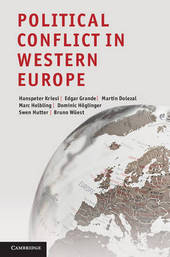
|
Political Conflict in Western Europe
Hardback
Main Details
| Title |
Political Conflict in Western Europe
|
| Authors and Contributors |
By (author) Hanspeter Kriesi
|
|
By (author) Edgar Grande
|
|
By (author) Martin Dolezal
|
|
By (author) Marc Helbling
|
|
By (author) Dominic Hoeglinger
|
| Physical Properties |
| Format:Hardback | | Pages:368 | | Dimensions(mm): Height 236,Width 158 |
|
| ISBN/Barcode |
9781107024380
|
| Classifications | Dewey:320.94 |
|---|
| Audience | | Professional & Vocational | |
|---|
| Illustrations |
42 Tables, black and white; 34 Line drawings, black and white
|
|
Publishing Details |
| Publisher |
Cambridge University Press
|
| Imprint |
Cambridge University Press
|
| Publication Date |
26 July 2012 |
| Publication Country |
United Kingdom
|
Description
What are the consequences of globalization for the structure of political conflicts in Western Europe? How are political conflicts organized and articulated in the twenty-first century? And how does the transformation of territorial boundaries affect the scope and content of political conflicts? This book sets out to answer these questions by analyzing the results of a study of national and European electoral campaigns, protest events and public debates in six West European countries. While the mobilization of the losers in the processes of globalization by new right populist parties is seen to be the driving force of the restructuring of West European politics, the book goes beyond party politics. It attempts to show how the cleavage coalitions that are shaping up under the impact of globalization extend to state actors, interest groups and social movement organizations, and how the new conflicts are framed by the various actors involved.
Author Biography
Hanspeter Kriesi holds the Chair in Comparative Politics in the Department of Political Science at the University of Zurich. Edgar Grande holds the Chair in Comparative Politics in the Department of Political Science at the University of Munich. Martin Dolezal is a postdoctoral researcher for the Austrian National Election Study (AUTNES) and Assistant Professor (Universitatsassistent) at the Department of Government, University of Vienna. Marc Helbling is Head of the Emmy Noether research group 'Immigration Policies in Comparison' (IMPIC) at the Social Science Research Center Berlin (WZB). Dominic Hoeglinger is a research fellow in the Institute of Political Science at the University of Zurich. Swen Hutter is a research fellow at the Chair for Comparative Politics at the University of Munich. Bruno Wuest is a research fellow in the Institute of Political Science at the University of Zurich.
Reviews'Political Conflict in Western Europe is a major new book about the ongoing transformation of political conflict in Europe at both the national and regional levels. The authors first describe and then explain how the axes of conflict are undergoing important changes and the role played by globalization in this process. They describe how these conflicts emerge in the context of globalization, how they are articulated in national and European political spaces, and how political parties mobilize these conflicts via electoral strategies. In contrast to their previous work, this book focuses on the supply side of the story of political conflict, in particular the role of the electoral arena and electoral strategy in shaping conflict and protest at both European and national levels. This is a must-read for students of globalization, electoral politics, political mobilization, and public protest.' James A. Caporaso, University of Washington 'Political Conflict in Western Europe is a forceful statement about the emergence of a globalization conflict in Western Europe. A must for anyone interested in contemporary West European politics.' Christoffer Green-Pedersen, Aarhus University 'This book innovates in the analysis of European political realignments in multiple regards. In substantive terms, it places issue divisions about the interface between domestic politics and its regional and global embeddedness front and center. In terms of scope of political participation, it investigates the relationship among different modes of political mobilization. And in terms of data collection, it advances quantitative content analysis as a source of information about political alignments and brings frame analysis to bear on it. This book will clearly be essential reading for anyone hoping to contribute to this subject area.' Herbert Kitschelt, George V. Allen Professor of International Relations, Duke University 'This book is required reading for Europeanists. Kriesi, Grande and their co-authors offer an analysis of political cleavages in Europe that is simultaneously comprehensive, subtle, rigorous, and convincing.' Gary Marks, Burton Craige Professor, University of North Carolina, Chapel Hill and Chair in Multilevel Governance, VU University Amsterdam
|